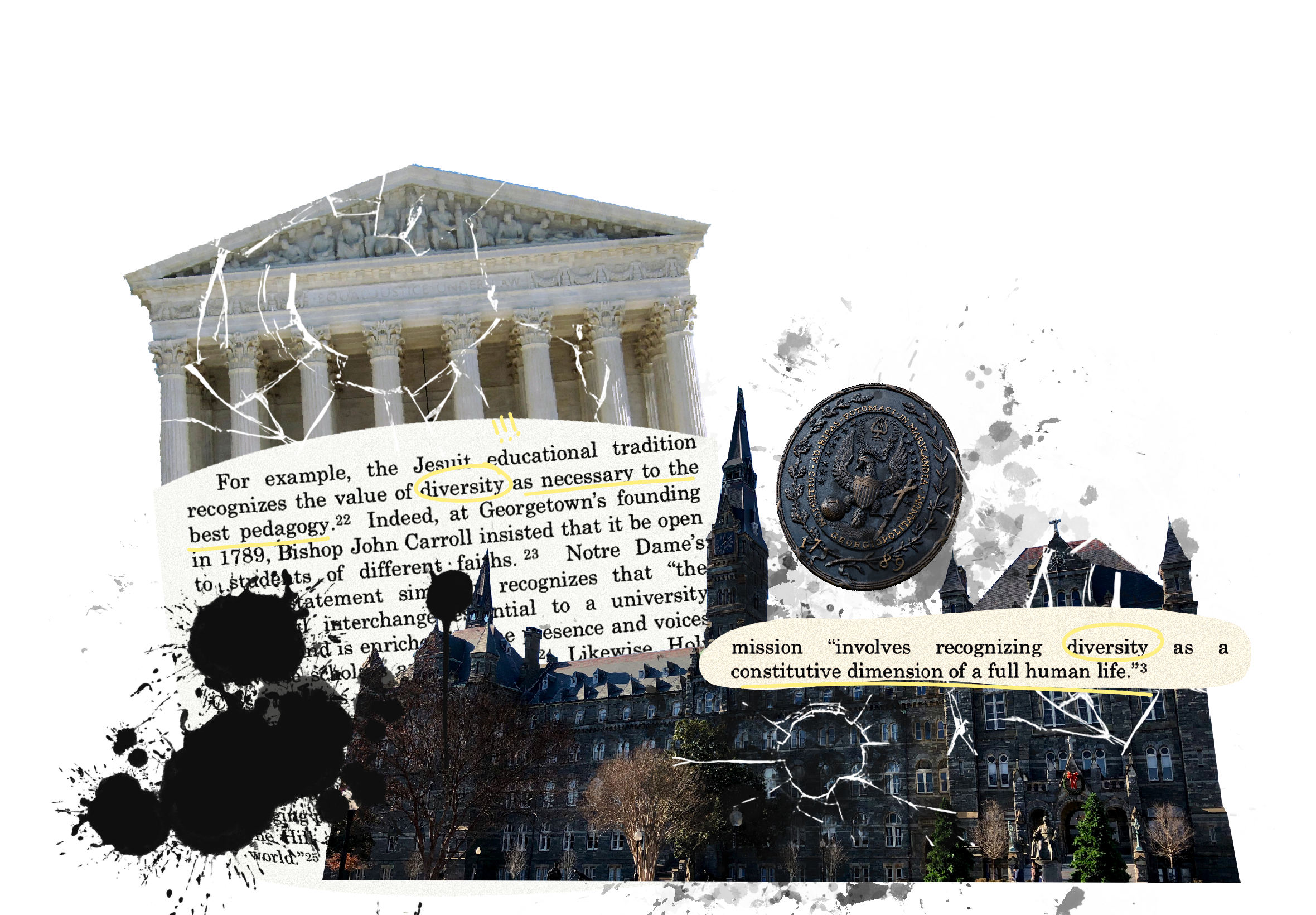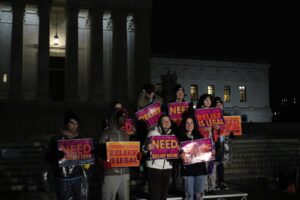Georgetown will be one of many institutions of higher education forced to reconsider its admissions practices this fall following a Supreme Court decision on June 29 that ruled affirmative action unconstitutional. In response to the ruling, the university emphasized a commitment to diversity as well as recruitment and support programs for students of all backgrounds, though how the admissions process will be affected remains unclear.
Advocates of affirmative action argue diversity is necessary at elite institutions to provide equitable access to higher education, job opportunities, and potential economic advancement, especially to historically marginalized or underserved communities.
“[The ruling] goes against precedent, it goes against legal doctrine, it misconstrues the Brown v. Board of Education ruling, and what it does is it further entrenches inequality,” associate professor and director of the Georgetown Law Racial Equity in Education Law and Policy Clinic Janel George said.
Georgetown has filed three amicus briefs in the last 20 years to support the legality of affirmative action. The university’s most recently filed brief was cited in Justice Sonia Sotomayor’s dissenting opinion of the ruling that banned affirmative action on June 29. The brief argued that race-conscious admissions were “key” to the university’s Jesuit spirit, which encourages a commitment to the common good, social justice, and service to others.
The 6-3 ruling overturned legal precedent on affirmative action dating back to 1978, prompting the university to release several statements hinting at its next steps.
“I’m looking forward to deploying all permissible measures available to us so we can benefit from the tremendous advantages that flow from a diverse campus community,” Olabisi Okubadejo, Georgetown’s associate vice president of equal opportunity, affirmative action, and compliance, said in the university’s response to the ruling on June 29.
A spokesperson for the university cited various recruitment initiatives as ways that the university has and will continue to encourage diversity on campus, including DC Reads, the Institute for College Preparation, and the Summer College Immersion Program, which provide precollege academic preparation.
“Georgetown will pursue all available efforts to cultivate and support a diverse Hoya community,” a university spokesperson wrote to the Voice. The spokesperson declined to specify what actual changes will be made in response to the Supreme Court ruling.
As universities navigate the new legal landscape, applicants, advocacy groups, and law firms will be watching their next move.
“The real issue here is America’s profound racist history. Affirmative action, race-conscious affirmative action was essentially a band-aid on a gaping wound,” research professor and director of the Georgetown University Center on Education and the Workforce Anthony Carnevale said.
“I think that it’s slim pickings on remedying the results of the cases,” he added.
In the majority opinion, Chief Justice John Roberts sanctioned the consideration of race in situations in which race is tied to an applicant’s individual character, like in applicants’ personal essays. Other possible adjustments to admissions practices include a heavier consideration of applicants’ economic background, eliminating legacy admissions, and increasing financial aid. Georgetown currently provides preferential admission to descendants of faculty, staff, and alumni, in addition to GU272 descendants, though legacy status only impacts admissions for students on the border of acceptance and rejection.
A study Carnevale co-authored concluded that class-conscious admissions models can potentially help level the playing field for applicants of color.
“Racism and classism are distinct but overlapping phenomena that operate most powerfully in combination,” Carnevale and the co-authors wrote in the study.
Despite potential mitigation efforts, Carnevale and numerous experts agree: the loss of affirmative action will nearly undoubtedly impact the attendance of Black and Latino students at universities. With primary and secondary education in the U.S. shaped by disparities in resources, teachers, and funding that exist largely along racial lines, affirmative action was one of the few tools available for colleges to account for these differences in opportunity.
“In a way, our K-12 system is the source of the problem,” Carnevale said. “The colleges are the end of that game. They’re the capstone on the system, so they’re going to get blamed.”
Some, like Richard Kahlenberg, writer and expert witness for the plaintiffs, applauded the ruling in hopes of a greater use of economic-conscious admissions.
“Universities like Harvard and UNC tried to achieve racial justice on the cheap by recruiting fairly well-off students of color to be on campus alongside of even wealthier white and Asian students,” Kahlenberg wrote to the Voice. “I hope universities reach out to meaningful numbers of low-income and working-class students as a new way of producing racial diversity and stop giving affirmative action to the rich in the form of legacy preferences and preferences for the children of faculty and donors.”
Nonetheless, it is unclear the extent to which economic-conscious admissions can be deployed as a means of increasing racial diversity since the ruling explicitly bans race-conscious admission. For some institutions, economic-conscious admissions also can force universities to take on increased costs when fewer students who can pay full tuition are admitted, according to Carnevale. His study found that effectively increasing socioeconomic diversity at selective universities often requires considering race in the admissions process.
“One thing that is relatively clear, I think, at least the college presidents I talked to, they’re going to try. They’re very nervous,” Carnevale said.
This year’s admissions cycle will put admissions reforms to the test as colleges that see diversity as central to their educational missions seek to maintain it.
“All students deserve access to an education that is eye-opening, that may challenge some of their assumptions, that inspires them to learn and grow,” George said. “And that’s what I hope education will continue to be, a place where students can grow and learn and reflect, engage in self-reflection, and collaborate with peers and people of all different backgrounds.”





